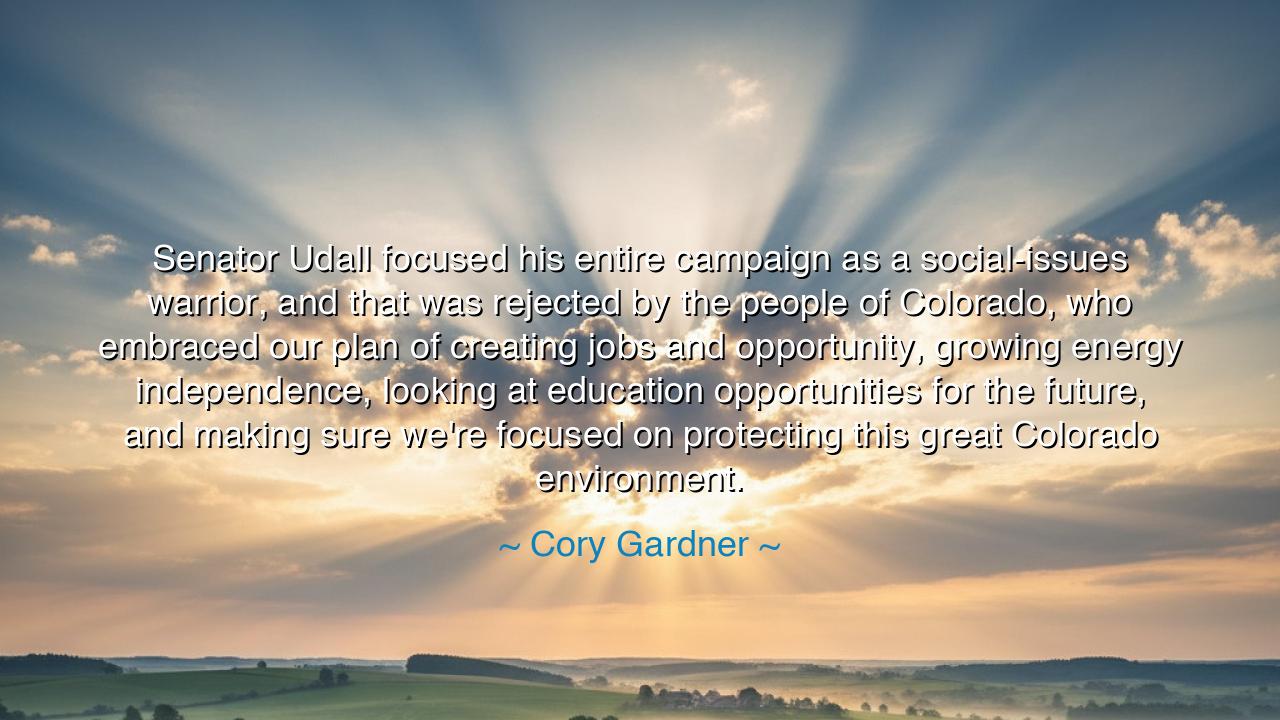
Senator Udall focused his entire campaign as a social-issues
Senator Udall focused his entire campaign as a social-issues warrior, and that was rejected by the people of Colorado, who embraced our plan of creating jobs and opportunity, growing energy independence, looking at education opportunities for the future, and making sure we're focused on protecting this great Colorado environment.






The words of Cory Gardner, spoken after his victory in the 2014 U.S. Senate race in Colorado, carry a resonance that reaches beyond politics. “Senator Udall focused his entire campaign as a social-issues warrior, and that was rejected by the people of Colorado, who embraced our plan of creating jobs and opportunity, growing energy independence, looking at education opportunities for the future, and making sure we’re focused on protecting this great Colorado environment.” Within these words lies a deeper message about the heartbeat of a people — their yearning not for division, but for purpose; not for rhetoric, but for renewal. Gardner’s statement is not merely a reflection of an election’s outcome, but a parable about vision, balance, and the enduring wisdom of those who build rather than divide.
The origin of this quote rests in a moment of transition — the midterm elections of 2014, when the winds of American politics shifted. Mark Udall, the incumbent senator, had championed social issues with great conviction, emphasizing rights and protections, yet his campaign was criticized for focusing too narrowly on the politics of identity. Gardner, his challenger, chose another path — one that spoke of opportunity, energy, and independence, echoing the pioneer spirit of Colorado itself. When Gardner emerged victorious, he attributed his win not to partisanship, but to the people’s choice of hope over hostility, of creation over conflict. His words thus embody a truth as old as civilization: that leadership flourishes not in the heat of anger, but in the light of progress.
At the heart of Gardner’s message lies the principle of energy independence — both literal and symbolic. Colorado, rich in natural resources and innovation, stands as a microcosm of America’s potential: to harness the gifts of the land, to cultivate knowledge, and to build prosperity through self-reliance. Yet Gardner’s invocation of independence carries a spiritual echo as well. He reminds us that the true strength of a nation does not come from external dependence or endless contention, but from its people’s ability to work, innovate, and trust in their own capacity to shape destiny. Independence, in this sense, becomes not merely an energy policy, but a way of life — a call for individuals and communities to rise on their own strength and vision.
History offers countless mirrors to this truth. In the ancient world, when Athens grew divided between demagogues and builders, it was Pericles, the statesman, who reminded his people that greatness is achieved not through argument, but through the creation of beauty, knowledge, and opportunity. Likewise, in the early days of America, it was Abraham Lincoln who sought to unite a fractured nation by appealing not to bitterness, but to labor — to the shared promise that every man and woman could rise through effort and courage. Gardner’s quote belongs to this same tradition of thought — that prosperity, not polarization, is the true measure of a people’s wisdom.
Yet, Gardner’s words are also a subtle warning. He contrasts the “social-issues warrior” with the builder of opportunity, suggesting that societies can lose themselves when they wage endless wars of ideology. The ancients understood this well. When Rome descended into the factional strife of its late Republic, when each side sought victory instead of virtue, the empire’s moral foundation began to crumble. Likewise, when modern politics becomes obsessed with scoring battles rather than solving problems, the spirit of a nation grows weary. Gardner’s victory, then, was not merely electoral; it was symbolic of a people’s longing for renewal — a return to grounded values, practical progress, and shared purpose.
At its core, Gardner’s message speaks to the eternal balance between idealism and pragmatism. A society must dream, yes — but dreams unanchored to reality drift into chaos. Likewise, a nation must build — but building without vision turns to mere labor. The harmony of these two forces — vision rooted in practicality — is the foundation of every flourishing civilization. Gardner’s appeal to jobs, education, and environmental stewardship reveals a belief in this balance: that a free and prosperous people must both honor their ideals and cultivate their land, both expand their minds and preserve their world.
And so, the lesson that emerges from Gardner’s words is timeless: that leadership must not seek to inflame, but to inspire. Politics, like the governance of a household or the tending of a garden, must be guided not by anger but by purpose — by the quiet, determined labor of creation. The citizens of Colorado, in choosing the path of opportunity, reminded the world that people yearn most deeply not for endless debate, but for the dignity of work, the freedom of independence, and the hope of a better future for their children.
Let this truth, then, be passed down like wisdom from the ancients: a nation’s greatness lies not in its noise, but in its deeds; not in the bitterness of its divisions, but in the faith of its builders. When we turn from conflict to creation, from ideology to innovation, we honor both our past and our future. For as Cory Gardner’s victory showed — and as history forever confirms — the people will always choose the promise of growth over the emptiness of strife, and in that choice, the soul of freedom is renewed.






AAdministratorAdministrator
Welcome, honored guests. Please leave a comment, we will respond soon